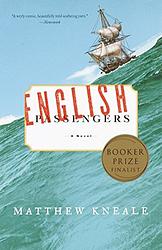English Passengers by Matthew Kneale
Set in the 19th century, this novel follows a group of Englishmen who, driven by different motivations, set off on a voyage to Tasmania. The group includes a vicar who believes Tasmania is the site of the Garden of Eden, and a doctor who is interested in studying the 'inferior' races. When they arrive, they encounter the harsh realities of British colonial rule and the near-extinction of the native population. The story is told from multiple perspectives, including that of a Tasmanian man, which provides a broad view of the cultural and social complexities of the era.
The 10473rd greatest book of all time
Ranking Details:
Our ranking system awards points to books based on their appearance and position on curated lists. Here's how it works:
Unranked Lists: For lists without specific rankings, each book receives points equivalent to the list's weight. This approach recognizes the book's inclusion on prestigious lists.
Ranked Lists: Books on ranked lists receive points in two ways:
- Base Points: Initially, every book is awarded points equal to the list's weight, acknowledging its significance.
- Bonus Points: Additionally, books earn bonus points based on their ranking. The total bonus pool, equal to 100% of the list's weight, is distributed among the books, with higher-ranked books receiving more points.
Exponential Distribution: The distribution of bonus points follows an exponential model. This means the top-ranked book (#1) receives significantly more bonus points than those further down the list (e.g., #100). Our algorithm ensures that higher placements are rewarded more generously, reflecting the achievement of a top rank on any given list.
This scoring system ensures that each book's ranking reflects both its presence on multiple lists and its positions within those lists, providing a comprehensive measure of its acclaim and popularity.
Total Points: 6
Since this book was first published in 2000, there is a penalty of 41.6%. The age adjusted score is 3.5.
This is to prevent newer books from reaching super high on the ranked list of the greatest books of all time. The greatest books should also stand the test of time.
- score: 6 -- Costa Book Award - Best Novel (Weight: 6)

